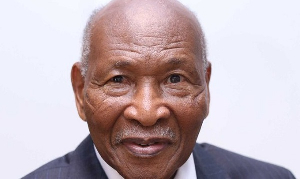Opinions of Thursday, 23 February 2023
Columnist: Stephen Mensah
Ghana has no need for Regional Ministers
Ghana, like many other countries, is currently facing an economic crisis. The country has been struggling to refinance its debt since the start of 2022, and its public debt stood at 467.4 billion Ghanaian cedis ($55 billion as per Refinitiv Eikon data) in September 2022, of which 42% was domestic.
The country's inflation rate has also surged to 54.1% in December 2022, driven by steep increases in food, transport, and housing costs. In addition to these economic challenges, Ghana has been facing a severe budget deficit, with 70% to 100% of the government revenue currently going toward servicing the debt.
In an effort to address these challenges, the government of Ghana has taken several measures, including reaching a $3-billion staff-level agreement with the International Monetary Fund (IMF), announcing a domestic debt exchange program that is currently facing stiff opposition and negotiating an external restructuring with creditors.
In this context, it is crucial that the government takes measures to reduce its expenditure and increase efficiency in order to mitigate the impact of the crisis on the population. One such measure that can be taken is the elimination of the 16 regional ministers.
The role of regional ministers, as outlined in Article 256 of the Constitution, is to act as representatives of the President in the regions and to be responsible for the coordination and direction of government machinery in the regions. However, this function can be performed by the Regional Coordinating Directors (RCDs) who are already in place. These RCDs are the chief administrative officers in the regions and are responsible for the day-to-day management of the region's affairs. They are also responsible for coordinating the activities of the various government agencies and departments in the region.
The role of Regional Ministers in Ghana is not only limited to coordinating and directing government machinery in the regions, but they also play a significant role in the budget allocation process. The budget estimate for just running the office of the President for the year 2023 is GH¢1,410,712,912. This is a significant amount of money that could be used for other essential government services, such as healthcare and education if the role of Regional Ministers were to be abolished.
Moreover, the presence of Regional Ministers in Ghana has not necessarily led to better governance in the regions. The Regional Ministers are often seen as political appointees rather than individuals who are qualified to hold such positions. This has led to a lack of accountability and transparency in the way they carry out their duties. The Regional Ministers are also seen as a source of patronage, with appointments to the position often being based on political considerations rather than merit.
The Regional Coordinating Directors (RCDs) have the necessary qualifications, experience, and skills to perform the functions of the regional ministers. They are also more familiar with the local conditions and issues in their regions, which enables them to make more informed decisions. Eliminating the regional ministers and giving the RCDs more autonomy and authority would not only reduce the government's expenditure but also increase the efficiency of the regional administration.
Furthermore, having 16 regional ministers also leads to duplication of work and inefficiencies. Each regional minister has a team of advisors and assistants, which leads to a large number of bureaucrats in the regional administration. This not only increases the government's expenditure but also results in slow decision-making and implementation of policies. By eliminating the regional ministers and giving the RCDs more autonomy and authority, the government can streamline the regional administration, reducing the number of bureaucrats and increasing efficiency.
In addition, having 16 regional ministers also leads to fragmentation of the regional administration. Each regional minister is responsible for their own region and may not be aware of the issues and concerns of other regions. This can lead to a lack of coordination and cooperation between regions, resulting in inefficiencies and a lack of progress in addressing regional issues. By eliminating the regional ministers and giving the RCDs more autonomy and authority, the government can promote greater cooperation and coordination between regions, resulting in a more cohesive regional administration.
In conclusion, the current economic situation in Ghana gives the government a rare opportunity to take measures to reduce its expenditure and increase efficiency. Eliminating the regional minister positions and giving the Regional Coordinating Directors more autonomy and authority would not only reduce the government's expenditure but also increase the efficiency of the regional administration. This would also lead to a reduction in duplication of work, an increase in efficiency, and a more cohesive regional administration.













